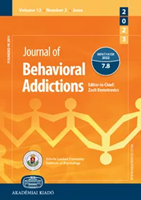Mental health professionals’ use of the ICD-11 classification of impulse control disorders and behavioral addictions: An international field study
Mental health professionals’ use of the ICD-11 classification of impulse control disorders and behavioral addictions: An international field study
Author(s): Johannes Fuss, JARED W. KEELEY, Dan J. Stein, TAHILIA J. REBELLO, JOSÉ ÁNGEL GARCÍA, Peer Briken, REBECA ROBLES, CHIHIRO MATSUMOTO, Christoph Abé, Joël Billieux, Jon E. Grant, Shane W. Kraus, Christine Lochner, Marc N. Potenza, Geoffrey M. ReedSubject(s): Individual Psychology, Neuropsychology, Clinical psychology, Behaviorism
Published by: Akadémiai Kiadó
Keywords: compulsive sexual behavior disorder; gambling disorder; gaming disorder; pyromania; kleptomania; intermittent explosive disorder;
Summary/Abstract: Background and aims: The ICD-11 chapter on mental, behavioral and neurodevelopmental disorders contains new controversial diagnoses including compulsive sexual behavior disorder (CSBD), intermittent explosive disorder (IED) and gaming disorder. Using a vignette-based methodology, this field study examined the ability of mental health professionals (MHPs) to apply the new ICD-11 diagnostic requirements for impulse control disorders, which include CSBD and IED, and disorders due to addictive behaviors, which include gaming disorder, compared to the previous ICD-10 guidelines. Methods: Across eleven comparisons, members of the WHO’s Global Clinical Practice Network (N 5 1,090) evaluated standardized case descriptions that were designed to test key differences between the diagnostic guidelines of ICD-11 and ICD-10. Results: The ICD11 outperformed the ICD-10 in the accuracy of diagnosing impulse control disorders and behavioral addictions in most comparisons, while the ICD-10 was not superior in any. The superiority of the ICD-11 was particularly clear where new diagnoses had been added to the classification system or major revisions had been made. However, the ICD-11 outperformed the ICD-10 only in a minority of comparisons in which mental health professionals were asked to evaluate cases with non-pathological high involvement in rewarding behaviors. Discussion and Conclusions: Overall, the present study indicates that the ICD-11 diagnostic requirements represent an improvement over the ICD-10 guidelines. However, additional efforts, such as training programs for MHPs and possible refinements of diagnostic guidance, are needed to avoid over-diagnosis of people who are highly engaged in a repetitive and rewarding behavior but below the threshold for a disorder.
Journal: Journal of Behavioral Addictions
- Issue Year: 13/2024
- Issue No: 1
- Page Range: 276-292
- Page Count: 17
- Language: English

